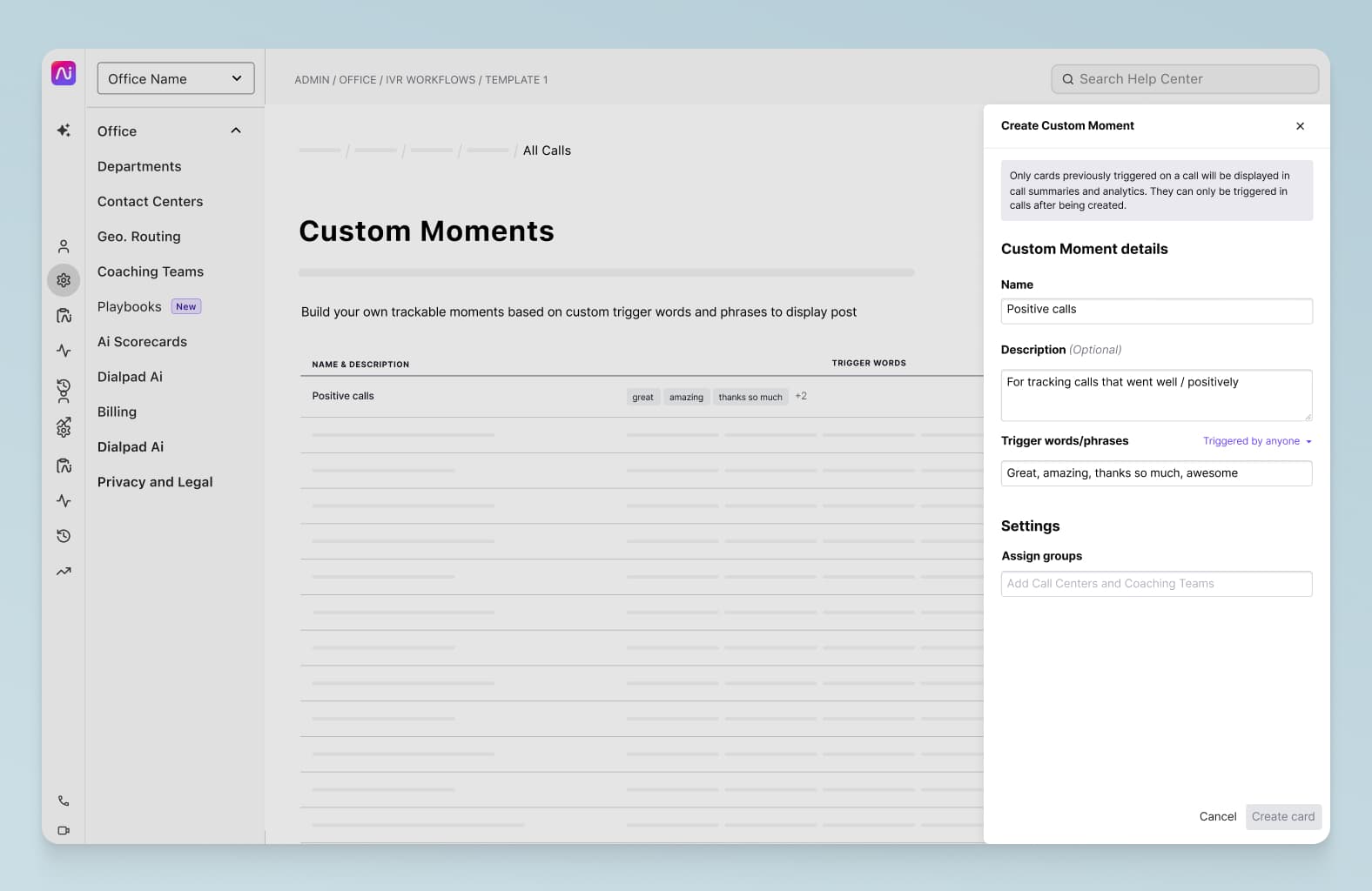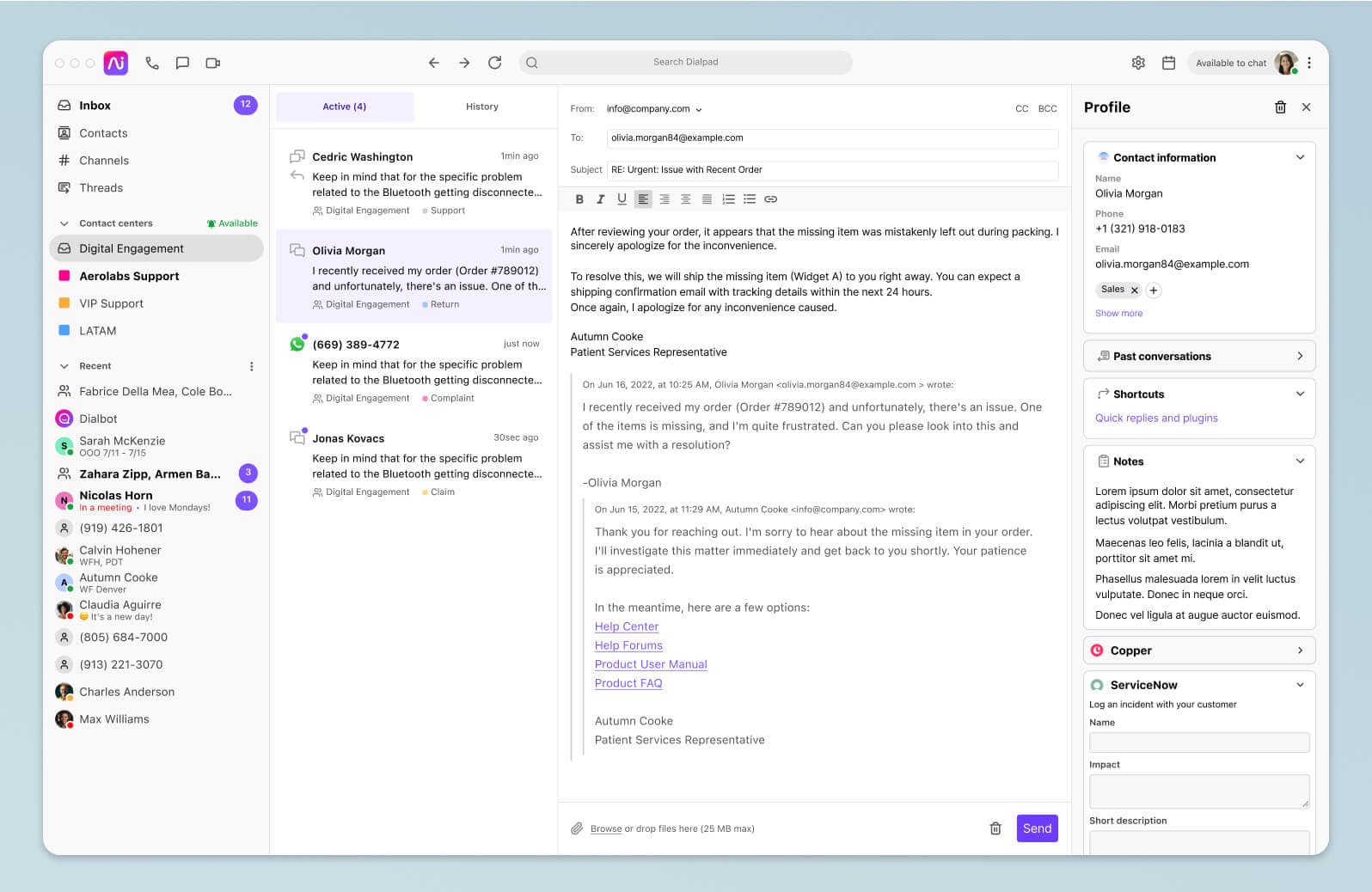B2B customer service: Delivering exceptional experiences when your customers are businesses

Customer Support Manager - Tier 1

Tags
Share
Providing a high-level of support in your business-to-business (B2B) interactions is a unique challenge. Your “customer” isn’t just one person anymore, which means their needs are more diverse (and more demanding), every lost deal counts for a lot more dollars, and every macroeconomic ripple—whether positive or negative—can be felt acutely when it’s contract renewal time.
So, how can your business provide the level of customer service that supports long-term customer relationships to the point where your customers view you as being central to their own organizational success and growth?
We provide customer service to businesses from SMBs to enterprises every day at Dialpad, and in this blog, I’ll walk you through some of the nuances of B2B customer service, a few strategies and best practices, and tools that can empower your agents and coaches to keep customers happy.
What is B2B customer service?
B2B customer service, or business-to-business customer service, encompasses the support provided by businesses to their clients, which are corporations—not individual consumers. Typically, this includes technical support, account management, consulting services, and ongoing support throughout the client lifecycle.
Principal differences between B2B and B2C customer service
B2B customer service goes beyond simple troubleshooting. It’s a lot more demanding than your typical retail or ecommerce brand’s customer support, and encompasses proactive relationship management, strategic guidance, and personalized assistance that’s tailored to the specific needs of business clients. Let’s look at these differences in more detail:
You’re not only serving one individual
In B2C customer service, interactions primarily involve individual consumers who are looking for help with products or services. The focus is on addressing immediate needs and ensuring customer satisfaction on a transactional basis.
In B2B customer support on the other hand, interactions often span multiple stakeholders and even multiple teams within an organization. To make things even more complex, these stakeholders sometimes also have different goals (conflicting goals, if you’re unlucky). You’ll have to navigate various decision-makers, influencers, and end users, each with distinct roles and responsibilities.
This complexity requires a more strategic approach that considers the collective needs and goals of the business as a whole. B2B customer service teams have to cultivate relationships with each stakeholder group, understanding their unique perspectives and aligning service delivery to support broader business objectives.
The customer’s needs are often more complex
B2B engagements often revolve around complex solutions tailored to specific business challenges.
This makes a lot of sense because in general, what is a B2B customer looking for? The answer is almost always related to higher growth and revenue. And to achieve this, they tend to seek partners who can offer specialized expertise, customized solutions, and strategic insights that address their industry-specific requirements. Because of this, B2B customer service teams must possess deep domain knowledge, technical proficiency, and the ability to provide consultative guidance.
Only by doing this can they understand the intricacies of their clients’ operations, anticipate future needs, and proactively propose solutions that drive operational efficiency and competitive advantage.
B2B relationships are typically longer term
In contrast to the often transactional nature of B2C interactions, B2B relationships are characterized by longer-term partnerships and ongoing engagements (although even this is starting to change).
In general, B2B transactions frequently involve contracts, service agreements, and recurring revenue models that span months or even years. Customer service in the B2B context focuses not only on resolving immediate issues but also on nurturing long-term relationships built on trust, reliability, and mutual benefit.
This means customer service teams play a critical role in maintaining client satisfaction throughout the lifecycle of the relationship, from initial onboarding and implementation to ongoing support and account management.
The goal is to demonstrate consistent value, responsiveness, and proactive communication to foster loyalty, minimize churn (if you’re a SaaS or subscription business), and maximize customer lifetime value.
Why it’s vital to get B2B customer service right
Getting customer service in B2B right is vital for several compelling reasons, including reducing customer churn and increasing customer lifetime value:
Reducing customer churn and increasing customer lifetime value
In the B2B SaaS landscape, where relationships are long-term and contracts are often renewed annually or monthly, reducing customer churn is crucial for maintaining revenue stability and profitability.
Effective customer service plays a pivotal role here because it ensures that clients receive consistent value, timely support, and solutions that align with their evolving needs.
By addressing issues not just promptly but proactively, B2B customer support teams can mitigate dissatisfaction and ultimately reduce the likelihood of customers switching to a competitor. This increases the likelihood of contract renewals and expansions, and directly impacts KPIs like ARR (annual recurring revenue), customer retention, and customer lifetime value over the duration of the relationship.
Improving chances of advocacy and referrals
Good customer service in B2B also increases the likelihood of getting positive word-of-mouth and referrals within your customers’ networks. Happy B2B clients are more inclined to endorse and recommend your products and services, participate in case study interviews, and even provide references to your sales team if they’re in the middle of a deal.
Positive word-of-mouth referrals carry especially significant weight in B2B, where peers’ recommendations and opinions on LinkedIn are often more valuable than reviews on third-party websites.
7 B2B customer service best practices
Now, let’s look at seven best practices for B2B customer service teams:
1. Understand your customers and make them the center of your vision
Understanding your B2B customers involves more than just knowing their business needs and basic industry information. It requires a deep knowledge of their industry challenges, goals, and strategic objectives.
For your CSMs (customer support managers), especially those who are assigned to a particular enterprise account, this is a must-do. It’s imperative that they make the customer the center of their vision and everyday work. Otherwise, it’s impossible to align your service delivery with customers’ priorities and contribute directly to their success.
Conduct thorough research, gather customer feedback enthusiastically (even the not-so-positive comments), and maintain open lines of communication to continuously adapt and improve your service offerings.
We use Dialpad Support to help us with the feedback portion of this work. As anyone who manages a customer service team is aware, one of the main challenges of customer satisfaction surveys is that not a lot of customers actually complete them.
And usually only the angriest—and happiest—customers actually bother responding, which means your CSAT feedback is likely to be extremely skewed and not representative of how your customers feel overall.
Dialpad's industry-first Ai CSAT feature is designed to solve that issue by inferring CSAT scores for up to 100% of your customer calls—no surveys needed—thanks to its hyper-accurate AI transcription feature. The result is a more representative sample size and a more accurate understanding of how satisfied your customers really are:

2. Treat each customer as an individual but automate processes where you can
While personalized service is crucial in B2B relationships, automation does play a pivotal role in streamlining repetitive tasks and enhancing operational efficiency.
The goal is definitely not to automate every single touchpoint in the entire B2B customer service experience. What you want to do is to automate the routine processes and basic support queries where a customer wouldn’t feel short-changed or frustrated due to the loss of the human touch.
This might look like having an AI-powered chatbot that answers simple questions like “When are your business hours” or integrating your tools to automatically sync conversation data from your contact center or customer engagement platform to your CRM:

The key is balance: Ensure that each customer interaction that requires a personal touch maintains it—while leveraging automation to deliver consistent and prompt service across all touchpoints. This will also allow for scalability later on, enabling your organization to handle growing customer volumes without compromising service quality.
3. Ensure customer service consistency by making cross-organization collaboration seamless
Consistency is key to building trust and credibility. Achieving consistent customer service doesn’t just require excellent from your support team either—you need the help of your partners in other departments, from sales and marketing to product development.
By fostering a customer-centric culture that emphasizes cross-functional teamwork and information sharing, you can ensure that every interaction with a customer reflects a unified commitment to excellence from the company.
This level of collaboration will help you resolve issues more quickly, proactively save accounts before they churn, and understand customer needs throughout their lifecycle.
4. Educate and train your employees to deliver exceptional customer service
Investing in agent education and training is essential for equipping your team with the skills, knowledge, and tools needed to deliver the best B2B customer experience. This includes ongoing training on product updates, industry trends, and customer service best practices.
AI is extremely helpful here, because it can automate many aspects of training that would otherwise take hours every week. Dialpad Ai helps our supervisors in many different ways, such as by tracking keywords and topics with “Custom Moments.” If we want to see how often customers are asking for refunds or churning, we can create a Custom Moment to track every time “money back,” “refund,” and/or “cancel” is said by a customer or an agent on a call:

This is a great B2B customer service example—business customers tend to have a much wider range of potential issues and churn reasons, and this way, if we notice any concerning trends, we can adjust our training materials and make sure that agents are equipped to handle these topics effectively. To deliver exceptional B2B customer service, being able to access and use conversational intelligence data in this way is crucial.
5. Use a range of channels to meet customers where they are
B2B customers often have diverse communication preferences and may prefer different channels depending on the nature of their problem or the urgency of their issue.
Offering a range of communication channels, such as phone, live chat, and B2B customer self-service portals ensures that you meet customers where they are while providing convenient access to support.
An omnichannel contact center platform is essential here because it enables seamless transitions between channels, allowing customers to start a conversation on one platform and continue it on another without having to repeat information:

6. Collect, analyze, and act on customer feedback
Implementing robust feedback mechanisms and tracking B2B customer service KPIs like customer satisfaction scores (CSAT) and net promoter scores (NPS) allows you to gather valuable insights about customer perceptions and pain points.
But even though analyzing this data helps you identify trends, pinpoint recurring issues, and prioritize areas for service enhancement, this is often easier said than done. With more data available than ever before, it’s easy to get overwhelmed just by the sheer amount of reports and dashboards you have to keep track of on an hourly or daily basis.
If you can, look for AI solutions that can reduce this reporting overload. For example, we use Dialpad's Ai Scorecards to support our customer service teams as they continue to scale up operations.
With Ai Scorecards, supervisors and admins can create a list of tasks on a scorecard, which Dialpad Ai will then use to verify if agents are executing all of those tasks in their customer calls.
Each task is automatically checked off as an agent completes it, so that when the supervisor reviews or grades the call later, they can easily see if a task was done or not. Instead of collecting and analyzing call recordings one by one, managers have saved a ton of time by using Dialpad Ai to speed this step up.
7. Be proactive as well as reactive
It’s important to react and respond when customers tell you something is wrong, but you can’t forget about proactive customer service either. Proactive support involves anticipating customer needs and addressing potential issues before they escalate. This can include regular check-ins and outreach to provide updates or relevant information, and offering solutions based on predictive analytics or customer behavior patterns.
Striking a balance between proactive initiatives and responsive problem-solving ensures that you deliver value consistently and build trust with your B2B customers.
Get B2B customer service right to build long-lasting customer relationships
B2B customer service looks a lot different today than it did even a few years ago. Done right, it can become a strategic asset that uncovers valuable insights and drives business success.
By delivering value at every touchpoint from social to live chat to phone calls, and using AI to coach agents to become more consultative and effective advisors, your team can provide a higher level of B2B customer service that sets you apart from competitors who are focused just on reactively solving issues.
Learn how some of today’s leading companies, from Randstad to ShipEX, are providing excellent B2B customer service with Dialpad Support.








